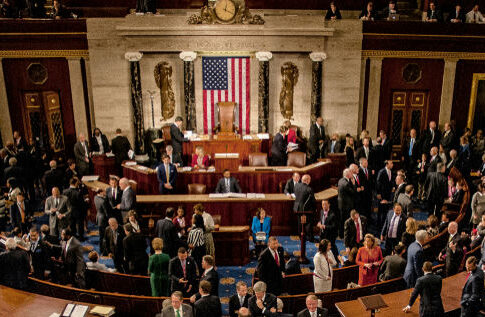Imagine being a Congressman forced to flee the capital because of a credible threat against your family, only to have political opponents call for protests at your home.
Heightened Tensions in Wisconsin’s 3rd Congressional District
In a district known for its unpredictability, the stakes have never been higher. Wisconsin’s 3rd Congressional District, a bellwether for national political trends, has seen its fair share of drama. Derrick Van Orden, a retired Navy SEAL and Republican Congressman, found himself in the eye of the storm when a credible threat against his family emerged. This forced him to abandon his duties in Washington, D.C. to ensure their safety. Just when you thought things couldn’t get more absurd, Rebecca Cooke, his Democratic opponent, found herself embroiled in controversy when audio surfaced from a fundraiser she attended. There, attendees were urged to protest at Van Orden’s home, despite the recent threat against his family.
This incident underscores the increasing tensions and aggressive tactics in political campaigns. While Cooke herself did not make the call to protest, her presence at the event raised eyebrows. The rhetoric and actions surrounding this campaign highlight the growing divide in American politics and the lengths some will go to sway public opinion. It’s a disturbing trend that not only reflects poor judgment but also poses potential risks to the safety of public officials and their families.
The Battle for Political Control
The 2024 race for Wisconsin’s 3rd District was the most expensive in its history, with combined fundraising efforts exceeding an astounding $12 million. This enormous sum speaks volumes about the importance both parties place on this swing district. Van Orden’s victory, albeit narrow, is a testament to the district’s continued conservative leanings, despite the Democrats’ best efforts to flip the seat. Rebecca Cooke, a business owner, and Democratic challenger, aimed to capture the moderate and independent vote, but fell short by 2.8 percentage points. Her campaign, characterized by outreach to the politically disengaged, did show increased engagement, but ultimately not enough to secure a win.
As a former Navy SEAL, Rep. Van Orden knows the most important qualities in a servicemember are only if they can shoot, move, and communicate.
The more division that exists among our military academy students, the less lethal they will be as a unit on the battlefield.
Watch👇 pic.twitter.com/UEK5L5yi7b
— Rep. Derrick Van Orden Press Office (@RepVanOrden) July 15, 2025
The intense focus on this district is not just about local representation; it’s about national power dynamics. With the House majority often hanging in the balance, every competitive seat counts. The Democrats, not deterred by the loss, are expected to prioritize the district again in 2026, especially with the narrowing margins in 2024. The stakes remain high, and the battle for control continues to fuel partisan strategies and substantial financial investments.
The Broader Implications and Safety Concerns
Protests at politicians’ homes have become alarmingly common, raising crucial questions about the ethical limits of political activism. The incident involving Van Orden has spotlighted the dangers of such tactics, which can border on harassment and pose serious safety risks to public officials and their families. The call for protests at his home, following a credible threat, exemplifies a troubling disregard for personal safety and the well-being of those in public service.
Two Wisconsin congressmen, Democrat Rep. Mark Pocan and Republican Rep. Derrick Van Orden, exchanged insults on Capitol Hill Wednesday.
The confrontation began after Van Orden gunned his motorcycle as Pocan was being interviewed by our Charlotte Scott. pic.twitter.com/o2g01XsF4U
— Spectrum News 1 Wisconsin (@SpectrumNews1WI) July 16, 2025
In the wake of these events, there is a growing concern about the chilling effect this could have on political participation. If public officials are continuously subject to threats and invasions of privacy, it could deter qualified candidates from seeking office, ultimately weakening our democratic processes. The debate over the ethics and legality of such actions is far from over, and it underscores the need for clear boundaries to protect those who serve the public.


